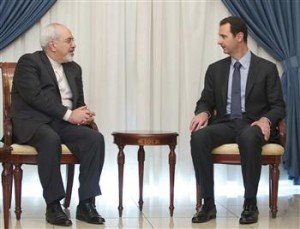 Despite international efforts pushing for peace talks between Syria's opposition and President Bashar Al-Assad's regime, it is still undetermined whether Iran, a stanch ally of Assad, will be invited to the talks.
Despite international efforts pushing for peace talks between Syria's opposition and President Bashar Al-Assad's regime, it is still undetermined whether Iran, a stanch ally of Assad, will be invited to the talks.
The talks, which are slated for 22 January and dubbed Geneva II, aim to end the conflict in Syria that has left 130,000 dead in nearly three years. They will be preceded by a preparatory meeting in Montreux, Switzerland.
Mohammad Javad Zarif, foreign minister of the Islamic Republic of Iran, met with Al-Assad today as part of a regional tour that includes Jordan and Lebanon.
Other developments include a meeting in Paris earlier this week where US Secretary of State John Kerry and ministers from 10 other countries in the "Friends of Syria" group tried to persuade the opposition to attend the talks next Wednesday.
The Syrian National Coalition, the main opposition alliance, is profoundly divided on whether it will take part in the negotiations.
Catherine Ashton, the European Union's foreign policy chief, is touring five Gulf states to shore up support for the talks.
Whether Iran will be invited to the talks remains a point of contention for the two powers spearheading the Geneva process: the United States and Russia. For its part, Washington urges Iranian authorities to first acknowledge in principle a transition of power in Damascus while Moscow views Iran as a main player.
UN Special Envoy to Syria Lakhdar Brahimi has thrown his weight behind Iran’s participation.
The postponement of a meeting between Iran and the International Atomic Energy Agency from 21 January to 8 February coincides with the commencement of the Geneva conference.
Syria's foreign minister told Zarif that Syria would not accept preconditions on the talks. The opposition has set Al-Assad stepping down as a precondition for negotiations.
The opposition is now demanding that Al-Assad’s regime offer a goodwill gesture, including a complete halt to bombing of rebel held areas and opening humanitarian corridors in support of a donor’s conference held for Syria in Kuwait.
Moscow is negotiating these terms with Al-Assad.
Ali Nouri Zada, director of the Arab-Iranian Studies Centre in London, told Ahram Online in a phone interview that “It is normal that Iran take part in the upcoming conference, considering it is a party that cannot be avoided. But what would this participation look like?”
Zada questioned whether the US would predicate Iran’s participation on its recognition of Geneva I, which stipulated a transfer of power in Syria, which Iran “will not accept because Al-Assad cannot be out of the equation.”
As well as ending in an agreement to form a transitional government, thereafter much disputed, Geneva I also entailed implementing a truce.
Zada added that Iran would probably join the Geneva II talks, but as an observer.
By Ahram Online
The Iran Project is not responsible for the content of quoted articles.

 QR code
QR code